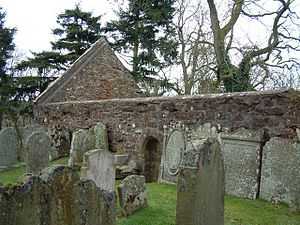Palladius (bishop of Ireland)
| Saint Palladius | |
|---|---|
| Bishop | |
| Born | 5th century |
| Died | 457-461 |
| Venerated in |
Roman Catholic Church Eastern Orthodox Church Anglican Communion |
| Patronage | Leinster, Kincardineshire |
Palladius (fl. 408–431; died probably ca 457/461) was the first Bishop of the Christians of Ireland, preceding Saint Patrick; the two were perhaps conflated in many later Irish traditions.
Armorica
The Palladii were reckoned among the noblest families of Gaul and several of them held high rank in the Church of Gaul.[1] Palladius was the son of Exuperantius of Poitiers, of whom the contemporary pagan poet Rutilius Claudius Namatianus wrote: "Even now his father Exuperantius trains the Armoric sea-board to love the recovery of peace; he re-establishes the laws, brings freedom back and suffers not the inhabitants to be their servants' slaves."[2] Exuperantius was apparently praefectus praetorio Galliarum ("Praetorian prefect of the Gallic provinces") when killed in an army mutiny at Arles in 424.
Prosper of Aquitaine describes him as a deacon.[3] Some writers with Dr. Todd regard Palladius as deacon of St. Germanus, but it appears more probable that he held the high rank of Deacon of Rome; it can hardly be supposed that a deacon of Auxerre would exercise such influence in Rome as that assigned to Palladius, and it is in accordance with St. Prosper's usage to indicate the Roman deacon by the simple title diaconus.[1]
Palladius was married and had a young daughter. He is described as a friend and younger kinsman by Namatianus. In Rome, he kissed his family goodbye in the manner of the Apostles, and lived as an ascetic in Sicily about 408/409, giving his daughter to a convent on that island. He seems to have been ordained a priest about 415. He lived in Rome between 418–429, and appears to be the "Deacon Palladius" responsible for urging Pope Celestine I to send the bishop Germanus to Britain, where he guided "the Britons back to the Catholic faith."[4]
Ireland
It is a question whether or not it is the same person who, in 431, was sent as first bishop to the Christians of Ireland: Palladius, having been ordained by Pope Celestine, is sent as first bishop to the Irish believing in Christ.[5] Palladius landed at Hy-Garchon, where the town of Wicklow now stands.[6] The Irish writers of the lives of St. Patrick say, that St. Palladius had preached in Ireland a little before St. Patrick, but that he was soon banished by the king of Leinster, and returned to North Britain. [7] According to Muirchu, who lived two centuries later, in the Book of Armagh, God hindered him...and neither did those fierce and cruel men receive his doctrine readily, nor did he himself wish to spend time in a strange land, but returned to him who sent him.[1] Palladius was accompanied by four companions: Sylvester and Solinus, who remained after him in Ireland; and Augustinus and Benedictus, who followed him to Britain, but returned to their own country after his death. [6] Palladius is most strongly associated with Leinster, particularly with Clonard, County Meath.

Scotland
After Palladius had left Ireland, he arrived among the Scots in North Britain, according to St. Prosper, in the consulate of Bassus and Antiochus, in the year of Christ 431.[7] There is also a cluster of dedications in the Mearns in Scotland, where the village of Auchenblae is believed to be his last resting place. As late as the reign of James V royal funds were disbursed for the fabrication of a new reliquary for the church there, and an annual "Paldy Fair" was held at least until the time of the Reformation. Scottish church tradition holds that he presided over a Christian community there for around 20 years.
Death
His date of death is unknown; however, the Annals of Ulster contain the following references:
- 457 "Repose of the elder Patrick, as some books state"
- 461 "Here some record the repose of Patrick"
- 492 "The Irish state here that Patrick the Archbishop died."
- 493 "Patrick... apostle of the Irish, rested on the 16th day before the Kalends of April..."
Thus, it is possible that later writers confused Palladius and Patrick. If the earlier dates of 457/461 indeed refer to him, then it seems that the actual St Patrick died much later about 492/493. Patrick's mission was largely confined to Ulster and Connacht, while Palladius seems to have been active in Leinster, particularly in the area around Clonard.
The Vita tripartita states that he died at Cell Fine (thought to be modern-day Killeen Cormac, County Kildare), where he left his books, together with a writing tablet and relics of Peter and Paul. Alban Butler, citing Hector Boethius and Camden, says that he died at Fordun, fifteen miles south of Aberdeen, about the year 450.[7]
See also
Notes
- ↑ 1.0 1.1 1.2 Moran, Patrick Francis Cardinal. "St. Palladius." The Catholic Encyclopedia. Vol. 11. New York: Robert Appleton Company, 1911. 30 Jan. 2013
- ↑ Duff, J. Wight and A. M. Duff trans. (1922). Minor Latin Poets. Loeb Classical Library. pp. 782f.
- ↑ Patrologia Latina 51:594.
- ↑ Stokes, G.T., "Palladias, bishop of Ireland", Dictionary of Early Christian Biography, (Henry Wace, ed.), John Murray and Co., London, 1911
- ↑ Entry for AD 431 Chronicle of Prosper of Aquitaine
- ↑ 6.0 6.1 Cusack, Margaret Anne, "Mission of St. Palladius", An Illustrated History of Ireland, Chapter VIII
- ↑ 7.0 7.1 7.2 Butler, Rev. Alban, "St. Palladius, Bishop and Confessor, Apostle of the Scots", The Lives of the Saints, Vol.VII, 1866
Bibliography
- "New light on Palladius?", Peritia iv (1986), pp. 276–83.
- Ó Cróinín (2000). "Who Was Palladius 'First Bishop of the Irish'?". Peritia 14: 205–37.
- Vita tripartita Sancti Patricii (MS)
Further reading
- O'Rahilly, Thomas F. (1942). The Two Patricks: A Lecture on the History of Christianity in Fifth-Century Ireland. Dublin: Dublin Institute for Advanced Studies.
| ||||||||||||||||||||